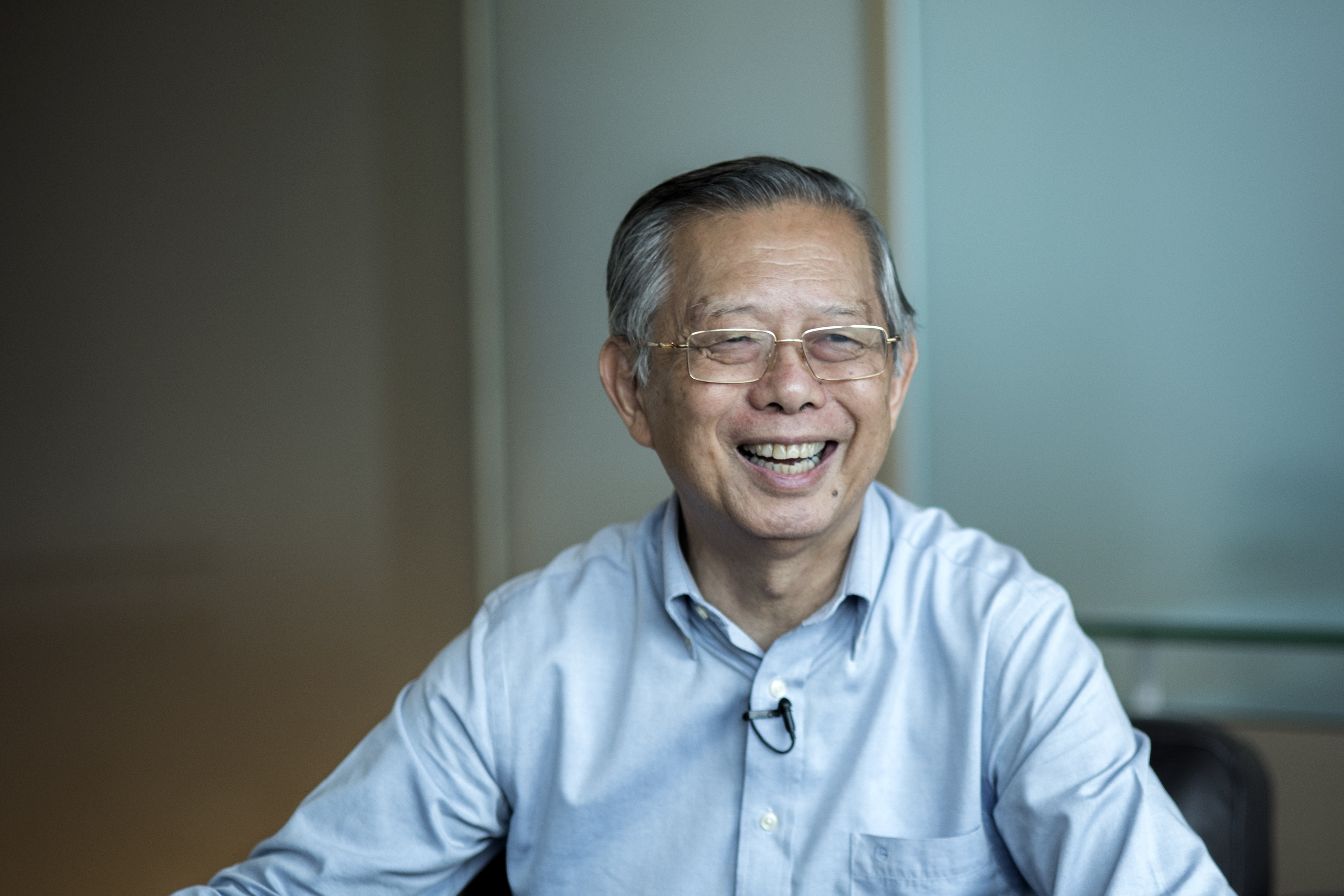“Almost Famous” is a new feature interview series on Mothership.sg. Here, we bring you in-depth stories of people who could be more famous, with a new interview released every fortnight.
Every weekday morning, Lim Siong Guan wakes up at 5:45am in order to take advantage of free train rides into town before 7:45am, and he needs to because he still has a full-time job.
What's that, you might ask? Oh, being group president of GIC, that's all.
And if that sounds impressive, that's only what he's doing right now — he previously was the chairman of our tax authority IRAS, our business regulator ACRA as well as the EDB and the CPF board. He was also the head of the civil service between 1999 and 2005.
Here's a non-exhaustive list of things he's doing now -- on top of his full-time GIC group presidency:
- Adjunct professorship at the Lee Kuan Yew School of Public Policy, National University of Singapore
- Senior fellowship at the Civil Service College
- Founding Chairmanship at Honour Singapore
- Being a grandfather, and trying to clock 10,000 steps a day
And may we remind you at this juncture that he's 69?
We asked him if he was ever going to retire -- he responded by asking us what we meant by "retire", even volunteering the idea that everyone should work till their 90s:
"I think all of us need to be occupied. It's not just a matter of filling up time, but a matter of feeling that we have time to do something good. Contribute to the lives of people, help people succeed, help people grow, help people become better.
We all ought to think about what good are we doing. Whether you are setting an example to others. Whether you are helping other people grow, to reach their potential, because in many ways our own past has given us the opportunities. Now, how do you open the way for other people?"
Working for LKY the "freest" three years of his life
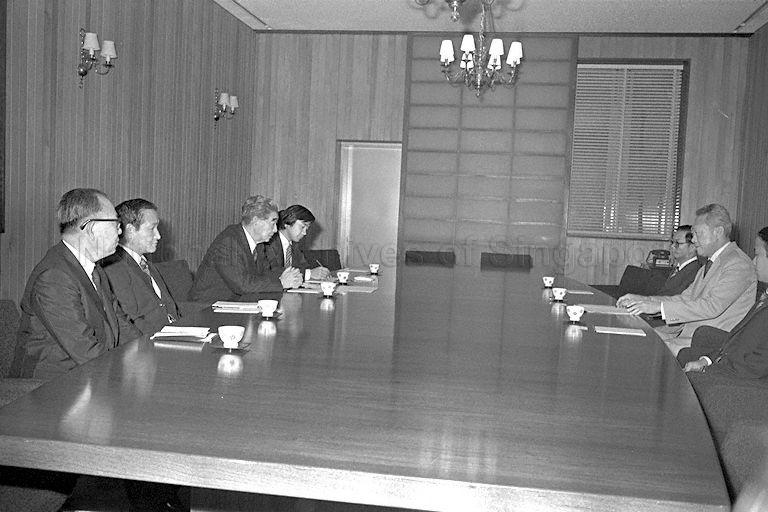 Lim seated on the right hand side of LKY during a meeting with a Japanese Minister. Source: National Archives online.
Lim seated on the right hand side of LKY during a meeting with a Japanese Minister. Source: National Archives online.
The above could perhaps explain our relative lack of surprise in the hour we spent with Lim on the 37th floor of Capital Tower when we learned how he described his experience as the first Principal Private Secretary (PPS) for the late founding Prime Minister (PM) Lee Kuan Yew.
"The three years (1978 - 1981) I spent under Mr Lee Kuan Yew were the freest, freest of my life," he says.
Who knew? But Lim explains, before we run away thinking that working for the late Lee was a breeze. Lim was "free" because his job came with clear boundaries and responsibilities.
"I'm his principal private secretary. I can only work on what is of interest to him. So if he says this is his area of interest, I read up on it, I work on it, I give him the presentations of the papers he wishes me to help him in his job. If this is not something of interest to him, I can't go around the ministries... and sort of saying 'this is what I would like to know'. It's nothing got to do with what I would like to know. This is what the prime minister wants to know. So that... makes me much freer."
As "free" as Lim's tenure as the late Lee's PPS was, Lim learned a lot from the late Lee in those "very inspiring three years": to always look foreign officials in the eye instead of on the ground, for instance, as well as the art of negotiation and communication.
"Mr Lee was very intense about everything. He was very intense about the greening of Singapore. He wanted to figure out how to have green plants growing under fly-overs. He wanted flowers growing on lamp-posts. He wouldn't take no for an answer. To him, maybe this is impossible but you have to try. You have to demonstrate that despite trying and working it out, it didn't work. So that truly was very striking about Mr Lee... So just three years, very intense, but in many ways very inspiring and very satisfying."
His most memorable assignment: dealing with one of Singapore's wealthiest men
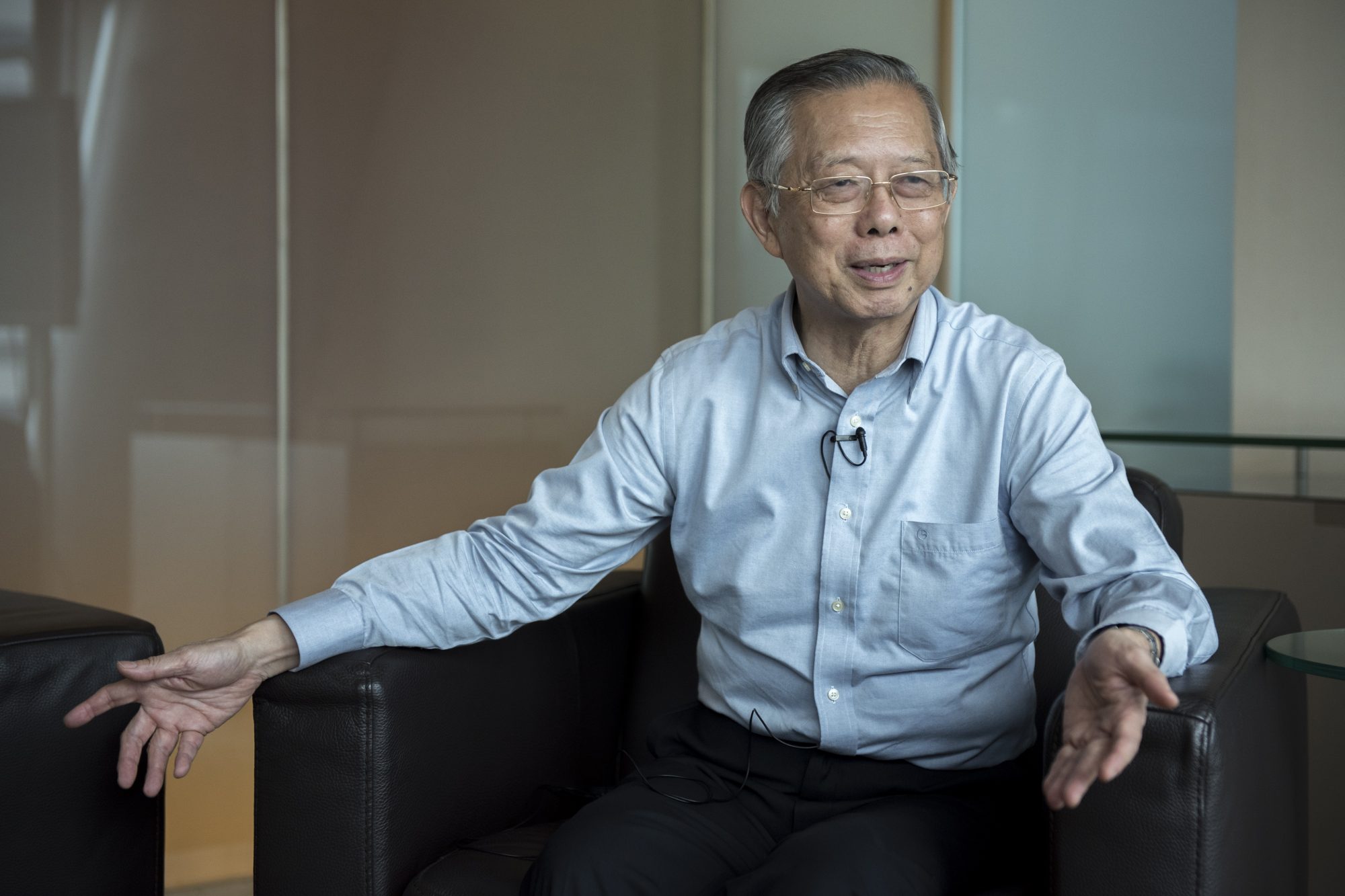 Photo by Lim Weixiang for Mothership.sg
Photo by Lim Weixiang for Mothership.sg
One of the toughest assignments Lim ever had from the late Lee was regarding the controversial merger between Nanyang University and the University of Singapore in 1980.
The predecessor of Nanyang Technological University, which started accepting students in 1956, was at the time a Chinese-language university. It was upheld by its alumni and students as a bastion of Chinese education and culture, and was also hailed as the "people's university" because the cost for its building was crowdfunded.
The late Lee had two reasons for the merger:
- He was concerned about potential unrest from the likelihood that graduates from Nanyang would not be able to compete against students from the University of Singapore, after noticing that students were entering with poorer grades than those studying at the latter.
- He wanted to pool both universities' resources into a stronger entity, with a focus on English as Singapore's lingua franca.
These reasons were not taken kindly by Nanyang's alumni, in particular, who viewed the merger as a political move.
Now, none of this explains where one of Singapore's richest men comes in — billionaire Wee Cho Yaw, UOB chairman who at the time headed the Hokkien Huay Kuan, was sitting chair of the Nanyang University Council.
Lim's assignment: to communicate the government's message to Wee.
"Mr Lee always thought in terms of what would Mr Wee Cho Yaw, as chairman of the Nanyang University Council, think. What is his interest? What is his responsibility with respect to Nanyang University Council?...[I]n what way does it (the issue of merger) represent responsibility on his part as the chairman of Nanyang University Council to agree to (it)? We learn very carefully in these circumstances, not only in terms of how do I convey this message to Mr Wee Cho Yaw but in terms of Mr Lee Kuan Yew thinking this through, and saying you always have to think in terms of what would represent for Mr Wee Cho Yaw this sense that he is doing what is right for the people. Because quite obviously, Nanyang University being merged with University of Singapore was a very highly emotional issue."
He didn't shed much more light on Wee himself apart from this, but his acknowledgement of the challenge this presented to him is no less fascinating.
Speaking up in the civil service
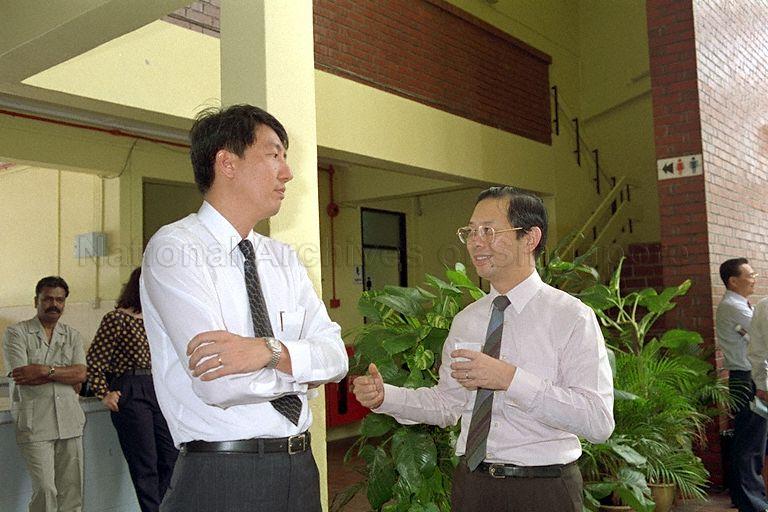 Lim, who was then Chairman of CPF, speaking to Teo Chee Hean. Source: National Archives online.
Lim, who was then Chairman of CPF, speaking to Teo Chee Hean. Source: National Archives online.
As the former head of the civil service, Lim is well-known for his obsession with helping to make his staff's lives easier. According to a 2014 interview with Susan Long, the question he always asks his staff is "How can I help you do your job better?", wherever he went.
He was also previously quoted saying he admired the late former Deputy Prime Minister Goh Keng Swee, who championed the idea that civil servants should speak out and justify their views.
As most civil servants might know, though, this isn't always the most straightforward of things to do.
Asked about this, Lim takes great effort to explain the context that civil servants work in:
"I think civil servants need to recognise the civil service is not an alternative government. The people get the government they voted and that government is the one which you can say interprets for the civil service what they believe the people want whether it is in the short term or in the long term. Otherwise the civil service itself will be lost. What are they supposed to do? Because you have 5.5 million people in Singapore. You got more than 3 million citizens. You can't possibly run the system with one million different ideas on what 3 point-something million citizens would like to have.
So the civil service needs somebody to interpret that, to say this is what the people would like to have. This kind of country they would like to have. And that's what the ministers do. They say: I got elected by the people as the government to deliver to the people the kind of country which the people believe is good for their future. And with that interpretation the ministers give, that is what constitutes the policy and strategic direction. The civil service takes that and interprets that into what they have to do.
So civil servants need to understand that it is not... that they can just go and advocate whatever they personally like. It is all within the context of a government's agenda, which is itself a response to what they believe to be the agenda to serve the people the best way possible."
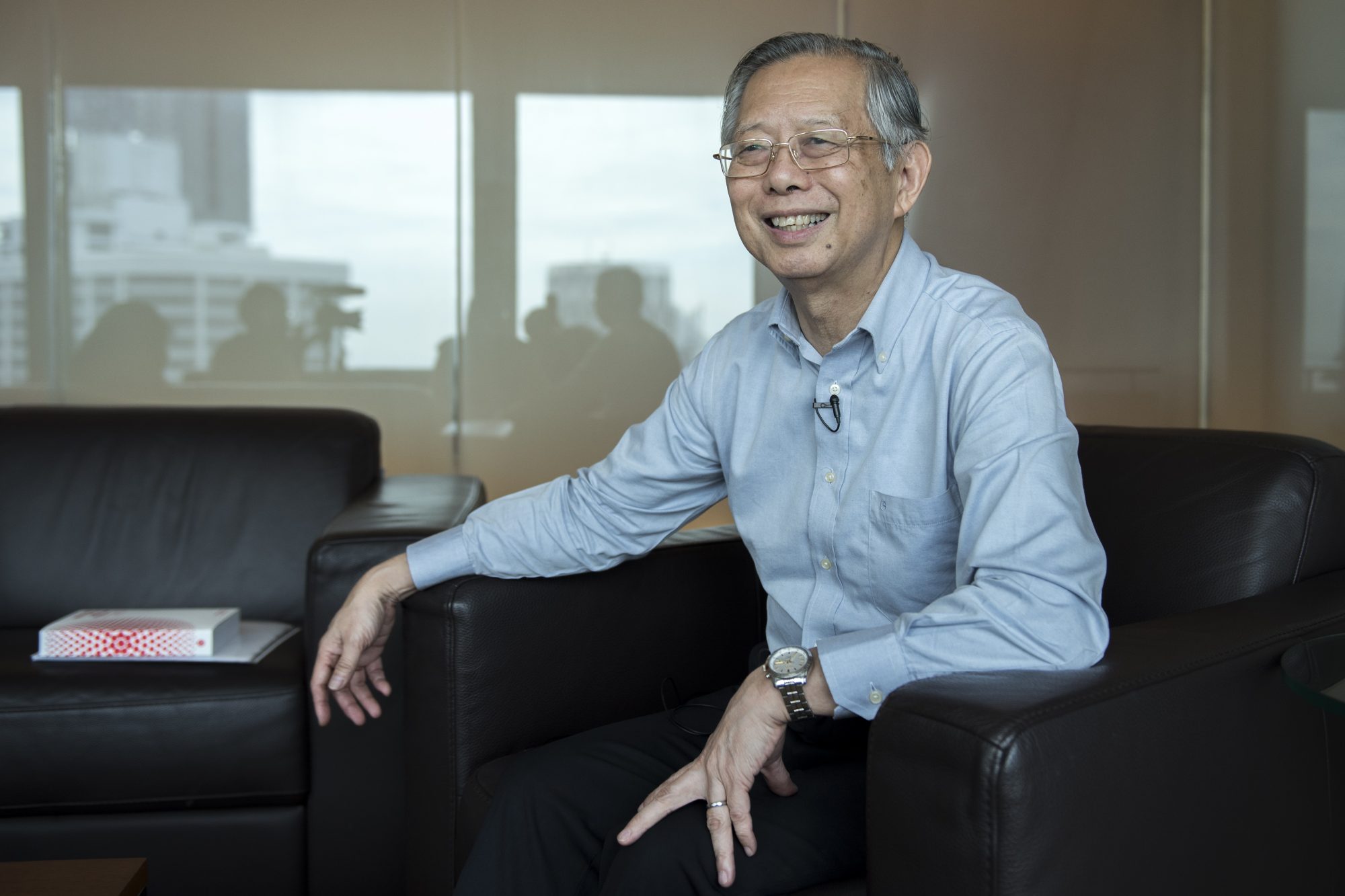 Photo by Lim Weixiang for Mothership.sg
Photo by Lim Weixiang for Mothership.sg
That said, Lim cautions against a civil service constantly trying to do solely what the minister wants, as opposed to getting things done in the most efficient, best manner possible.
"He should not be trying to second-guess the minister. If all civil servants like to second-guess the minister, then we end up with a whole bunch of yes-men — well, if I have a whole bunch of yes-men, all I need is the minister and nobody else needs to think. The whole reason of why you have groups of people in this is because you hope by that way, you have more eyes looking at issues, more brains thinking about the issue and you get a better outcome.
So civil servants should not be second-guessing — they should express and explain what they think is the best thing that should be done. The Minister may agree or disagree with that. But I do think that civil servants have a responsibility to express that view."
He also gives us a career lesson in how to communicate what might be conflicting perspectives that we have to our managers:
"But they need to understand also you have to express the view in a way which enhances your chances of getting the views heard and the views adopted, and at the same time have the humility so that if the views are not taken up, at least you need to understand why the views are not taken up. So perhaps your perspective or perhaps your interpretation of events is not what is understood or perceived by the minister to be the real issue."
And what if it's not a minister you're dealing with, but a senior civil servant? Lim's take is to just do it, if the "better way for something to be done" can be done on their own. Where it's not possible, here's his advice:
"It's a matter of effective communication. How do you convince your boss that this idea that you have is a good one and something the boss should approve? ... (so you need to ask yourself the question:) How can I help my boss do his job better? So you need to have that perspective. It shouldn't be 'I'm the smart guy with the idea, you the boss, I'm telling you my smart idea, you should approve because the idea is smart'. Rather it is in terms of 'What is my boss trying to accomplish?'
Remember, your boss also wants success. It's not like he wants to put everything down and he wants to fail. So he wants to succeed too. If you can have an appreciation, what is in your bosses' interest? What is it that would represent success to him? Present your idea in a way, which enhances the chances of your boss being able to succeed. Then your chances of getting that idea approved is much greater."
Like father, like son?
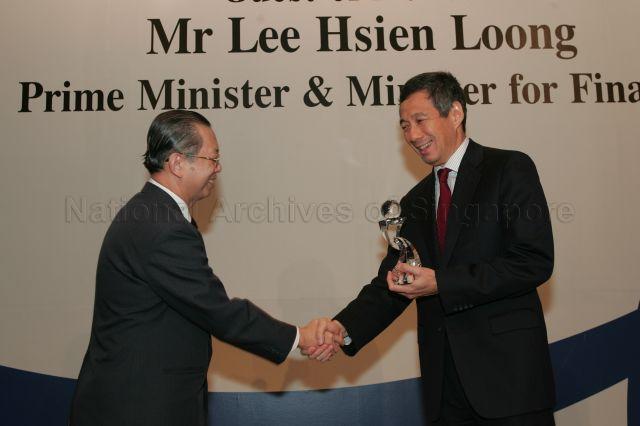 Prime Minister Lee Hsien Loong presenting a token of appreciation to Lim, who retired as Head of Civil Service in 2005. Source: National Archives online.
Prime Minister Lee Hsien Loong presenting a token of appreciation to Lim, who retired as Head of Civil Service in 2005. Source: National Archives online.
We had one final burning question for Lim, who was close enough to the late LKY to be one of the pallbearers at his funeral: how alike is current Prime Minister Lee Hsien Loong to his dad?
His answer was no less illuminating: a shared obsession with stressing to Singaporeans the need — that we nonetheless don't seem to recognise at all — to understand just how small we are in the world.
"I was watching (PM Lee's) National Day Rally speech... The fact that he showed this map of Southeast Asia, explained the South China Sea and talked about the Straits of Malacca, and talked about how critical it is for Singapore to assure freedom of navigation and access to air space. It's a big lesson in geography. And to me, Mr Lee Kuan Yew had always been about a keen understanding about geography. And it is geography — understanding how Singapore fits in the region.
And then you think about it: if you look at any map of the world and you look for where Singapore is, any map of the world Singapore fits within the letter 'O' of the name of the country. And if you think about what it means to fit into the letter O of the name of the country, and you are in Southeast Asia, and you are in this whole neighbourhood of ASEAN, you need to have a realistic view about what or how you need to behave as a country and about what you need to do to give yourself strength and capacity to ride through the ups and downs of what happens in the world."
Now, despite the decades he has spent in the close proximity of prominent politicians and political figures, Lim is at the end of the day not a politician — he is far better at extrapolating his ideas about the world than he is at telling stories about himself or his life experiences.
But there is one other thing he spent a long time talking about, and that's the importance of always looking ahead while holding firm to one key value that has defined Singapore's business brand and reputation: trustworthiness.
"Singapore is a brand. It is a brand about trustworthiness. About being people who honour our word. This is how we get multi-national corporations pouring huge amounts of money invested into Singapore and prepared to wait 10, 15, 20 years to get their money back."
He stresses this message in the two books (here and here) that he has published and co-written with his daughter Joanne, a public relations practitioner, in the hopes of reminding us of how we got here as we contemplate the journey ahead.
And you can rest assured, his work on this front — as with his career — is far from finished.
Read more stories in our Almost Famous series:
20 years of living in the U.S. later, S’pore’s first Googler still speaks fluent Singlish
Rather Famous: Joseph Schooling goes one-on-one with Mothership.sg
S’pore orangutan keeper’s story of love for apes, snakes and people
S’porean Navy scholar with computer science degree makes mark in international pop music and EDM
Top photo by Lim Weixiang for Mothership.sg.
If you like what you read, follow us on Facebook and Twitter to get the latest updates.
If you like what you read, follow us on Facebook, Instagram, Twitter and Telegram to get the latest updates.
